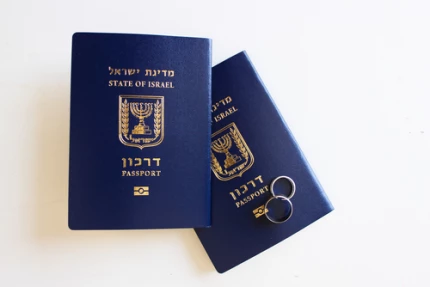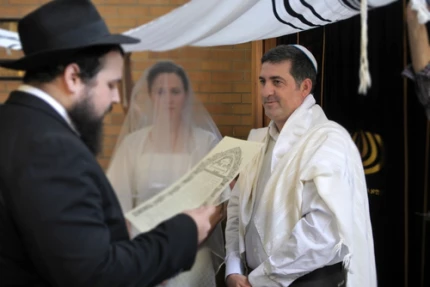Getting married in Israel
Israel has specific marriage legislation that looks at matters like citizenship, religion, and nationality. Moreover, it matters where you get married. And in some cases, documents need to be approved by lawyers and the seriousness of the marriage needs to be confirmed. Read on for the full information.
Marriage in Israel
Historically, some citizens of other countries (not related to the Jewish in any matters) have viewed marriage to a Jew as a means of legalization in Israel. But the union of a Jew and a citizen of another state might have serious legal implications. Like, it’s necessary to prove the purity of one’s intentions and go through other procedures.
an Israeli citizenship specialist
Despite multiple checks, Israel still allows non-Jews to obtain citizenship through marriage and become full-fledged citizens of society. Anyhow, one will have to prove that the union is not a sham. And even after proving it, one should not relax, as there will be regular checks.
When it comes to where people get officially married before making the move to Israel, countries with the least bureaucratic process would be the most popular:
- Czech Republic. It’s also worth noting that about 50% of all ceremonies of a kind are held there. In terms of numbers, 2,200+ people got married for this purpose in Cyprus in 2023, while only 286 in the Czech Republic.
- Latin American states. Pretty much all of them. Note that you can also get married online there, but this isn’t available everywhere. In Utah, for example, it is possible. However, in the same 2023, the ceremonial for such groups of people was performed 458 times.
Traditional Israeli wedding customs
Firstly, the date and time must avoid the Sabbath, Jewish holidays, and mourning periods. Next, the ceremony is held in a synagogue and it’s a requirement that the bride undergo a pre-wedding ritual immersion – Mikvah.
Then engagement (Tnoim) follows. It’s a formal agreement between families, often in writing, setting the date and including a symbolic action (Kinyan) by the groom and a plate-breaking ceremony by the mothers. A celebratory dinner will then be held. Overall, the attire is comparable to that observed in Western traditions, with the groom attired in a dark suit and men wearing head coverings. It’s thought that the bride will dress in a modest way and choose a light-colored outfit (since white symbolizes purity), and that female guests will also dress modestly.
Female attendees are also expected to dress in a modest manner. Music is also an important aspect of planning, yet there are no strict rules whatsoever. The ceremony includes the signing of a Ketubah – a marriage contract describing the rights and obligations of the couple, which still isn’t a religious document – it’s signed by the couple and two witnesses before the events, after which the terms are read to the guests.
Last, but not least, the Badeken (or Bedeken). A process of covering the bride’s face with a veil. It dates back to the biblical story of Jacob’s deception. This very ritual symbolizes the respect for the bride. Now, let’s talk about the wedding itself.
The ritual ends with the breaking of a glass beaker.
Wedding in Israel: fees
The fee for registration is fixed and is NIS 710. Still and all, there’s a chance one can get 40% off in some cases:
- Being an Ole Hadash and marrying in first two years of residing in the Holy Land;
- Serving in the IDF or undertaking national service;
- Being identified as having special needs by the Department of Social Services;
- Receiving the higher education.
Civil marriage and alternatives
A poll conducted by the Ne’emanei Torah Va’Avodah in 2016 revealed that 68% of Israelis support the establishment of a secular marriage institution. Even 25% of those respondents who consider themselves religious were in favor.
Registering the marriage in Israel
In order to commence the process, one needs to submit an application to the local religious council. In a timely manner. This is the sole method of initiating. Note that in the event that one of the partners has previously initiated the opening of a marriage file, it’s imperative that this be terminated at the same local religious council.
Subsequently, one must collate the requisite documentation to substantiate one’s lineage and identity:
- A Teudat Zehut, or passport for non-Israeli nationals;
- Three identical and standard-sized photographs for each partner. Self-evident that the image should be of the highest quality, with the face clearly visible.
- A birth certificate that might be required by some councils in order to prove the date and place of birth. Nevertheless, it’s not a prerequisite in all cases, although frequently required.
- Proof of Jewish ancestry (the most crucial item it is). For individuals born in the faith, a letter from a recognized rabbi is required, which must explicitly confirm a descendance from a Jewish mother and current single status. Those who have recently converted to Judaism are required to present official documentation of the conversion, as well as a letter from a rabbi confirming all the above things;
- Copies of the parents’ marriage contracts;
- Divorce/death certificates – if any;
- Original (and a copy) of the wedding hall’s Kosher status;
In addition to the aforementioned, the details of two witnesses who aren’t related to either partner and who can attest to their single status will also be required. Must be noted, however, that Israel also recognizes unions confirmed in other states – if the registration was done in accordance with that state’s laws and if a proper testimonial has been issued.
Nevertheless, the situation is not as straightforward as it may appear. Although this was an evident point, it bears reiterating. In the event that one of the spouses is an Israeli citizen and the other is not, the latter will be unable to enter Israel, despite the fact that the marriage has been duly concluded. Such a situation will only be possible once a number of conditions have been met.
Firstly, the spouse must be summoned to Israel in accordance with the stipulations set forth in the pertinent legislation. Subsequently, the original guarantee must be presented in the Holy Land, with a copy of the certificate retained by the non-citizen spouse.
Subsequently, it’s necessary to collate and prepare documentation that’ll serve to corroborate the veracity. To substantiate the assertion, one has to present joint photographs, correspondence, printed transcripts of even chit-chat conversations, witness statements, and other pertinent documentation.
The citizen-spouse is then required to submit all collected paper and evidence to Misrad Hapnim, along with a request for entry for the other spouse, which is a foreign. And only then reunification may be feasible. However, this is still isn’t the final stage. Upon arrival, the spouse must promptly proceed to the relevant branch of the Ministry of Interior (which is located at i their place of residence) to initiate the procedure for obtaining status.
Divorce
Israel is a secular state, yet Judaism has a strong influence on both social and political life. Marriage process included. So, Israeli law gives the rabbinate the right to decide who can marry and who can divorce. Thus, citizens can get married and divorced according to Torah in rabbinical courts.
There’s also a family court. Basically, the rabbinate deals with cases where both spouses are Israeli citizens or permanent residents and practice Judaism. The Family Court, however, deals with divorce cases in mixed marriages (interfaith, that is).
Also, it’s mandatory to get the consent of both parties to dissolve a marriage. One person wanting it isn’t enough. Come to think of it, the dissolution between two individuals who adhere to a specific religion typically requires the presence of compelling justifications. Such reasons include instances of violence, the inability to conceive after a period of ten years, and some serious illness.
The process is lengthy, with an estimated duration of between 15 months and five years. It is also important to note that a subsequent marriage is not permitted unless a Get (a religious proof of divorce) is issued. Such a document may only be issued with the voluntary consent of both spouses.
an Israeli citizenship specialist

